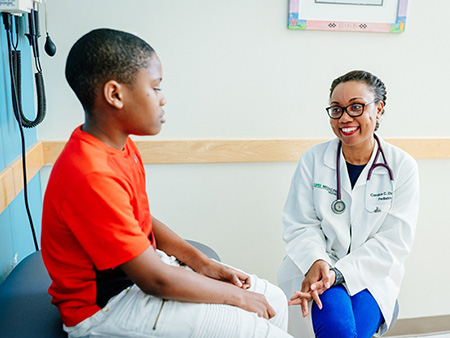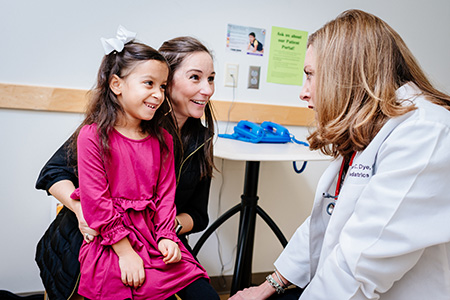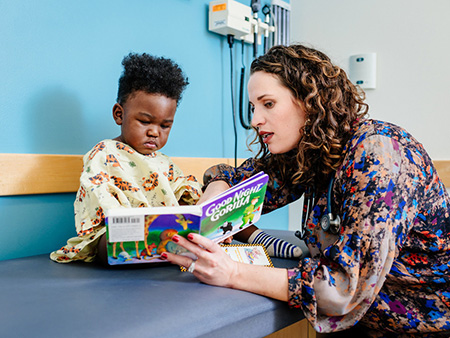Media contact: Savannah Koplon
 Thirty years ago, the primary focus of pediatric residency training was providing subspecialty experiences to future pediatricians. However, many residents would leave their training to pursue primary care careers out in the community, without a foundation of primary care-specific care and experiences.
Thirty years ago, the primary focus of pediatric residency training was providing subspecialty experiences to future pediatricians. However, many residents would leave their training to pursue primary care careers out in the community, without a foundation of primary care-specific care and experiences.
In an effort to provide important primary care experience to residents, and offer local patients a primary care clinic option conveniently based in the University of Alabama at Birmingham and Children’s of Alabama, efforts began to develop a clinic centered around primary care-specific services, which became the Pediatric Primary Care Clinic at UAB and Children’s. The success of the clinic is a testament to the evolving needs of the community and those of training pediatricians.
Evolution over three decades
Before 1990, pediatric patients received their primary care checkups by meeting residents in various open clinic spaces within available space at Children’s — whatever happened to be open that afternoon. At the time, the “clinic” was simply a cart rolled around by a nurse in absence of a true clinic space.
Recognizing the many shortcomings of this approach, the UAB Department of Pediatrics and Children’s teams committed designated space and staff to open the PCC with two nurses and a registration clerk. Three moves and 30 years later, the PCC has evolved into a general pediatrics clinic that provides a spectrum of primary care for children from birth to 18 years old.
What was once a rolling cart has grown into an 18-room clinic with 14 full-time employees, 13 attending physicians and more than 90 pediatric resident physicians who provide well-and-sick care to children across the Birmingham metro area; recently PCC hired a social worker who will work exclusively with the clinic to help address social determinants of health and, thus, barriers to health care and life in general for its patients.
“We are unique in that we are a UAB clinic but located within Children’s of Alabama,” said Candice Dye, M.D., associate professor of medicine in the Department of Pediatrics and medical director of the PCC. “Often patients have received some of their care within either or both of the UAB or Children’s systems, so they feel more comfortable with their primary care being here too. Existing for 30 years means that we are well established in the community, and we often have patients who come to us for their care because their parents were our patients when they were children. It’s really special to take care of generations of patients from the same family.”
Initially started in the UAB School of Medicine, the PCC today functions as a part of the University of Alabama Health Services Foundation, providing pediatric primary care for the community as well as a training site for the next generation of pediatricians. The PCC is UAB’s only completely pediatric primary care clinic and is located in the Park Place building on the Children’s campus.
 Training the next generation of pediatricians
Training the next generation of pediatricians
PCC has long been an integral part of training future pediatricians for the Birmingham community, state of Alabama and beyond. Since its doors opened, the PCC has trained more than 700 residents and counting. While some of those residents have moved on from UAB and the Magic City, many have remained local to provide primary care for Alabama’s children, a testament to the impact of the training PCC fosters.
In its inception, the clinic was open only in the afternoon, with each resident coming to clinic one afternoon a week.
“Initially, the goal was to provide primary care experience for the residents to prepare them for their pediatric careers, many of whom would work full time in primary care,” said Terry Wall, M.D., professor of medicine and division director of the Division of Academic General Pediatrics, which oversees the PCC. “Over the years, the goal has broadened to become a high-quality health care and educational center, expanding the clinic and its services.”
PCC is significant to its alumni residents because it is the place where many first experienced the joy of caring for children and adolescents.
“They get to follow a baby through all of the checkups of the first year, and then see them grow into toddlers by the time they graduate from residency,” said Carolyn Ashworth, M.D., senior pediatrician at the PCC and former division director of Academic General Pediatrics. “Residents also have the privilege of filling out health forms for 18-year-olds going to college or those enrolling in the military, and the residents celebrate with teens as they find their passion in trade vocations. The full spectrum of care is truly provided and taught.”
 Why UAB PCC
Why UAB PCC
More than anything, PCC is special as a dual-functioning primary care clinic and training facility.
“It means that you get two doctors for the price of one, as each resident checks out each patient to one of our attendings,” Dye said. “In this clinic, every patient receives care from a resident and an attending physician as they review the medical history and discuss the best plan for each patient.”
A parent can rest easy knowing that their 3-year-old will get exceptional care, and they can also bring their 12-year-old for care in the same visit. The PCC and its providers are proud to offer a place where families and patients can grow through all life stages, knowing they are cared for by exceptional providers using the latest technology and practice standards, as governed by the American Academy of Pediatrics.
Dye, Wall and Ashworth agree that the rewarding part of practicing at UAB lies in the impact they are able to make beyond the hospital.
“It is rewarding to work and train others in the PCC because we truly feel as though we are making a difference in the lives of children and families through health care and education,” Ashworth said. “It is hard to measure in terms of numbers and dollar signs, but we make a difference that we feel transcends the clinic walls and really makes an impact in the communities we are able to serve.”
For more information about the Pediatric Primary Care Clinic, visit here.